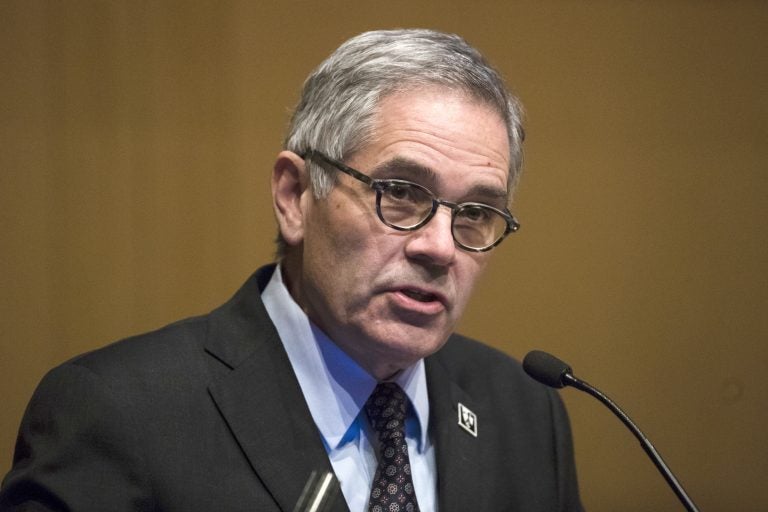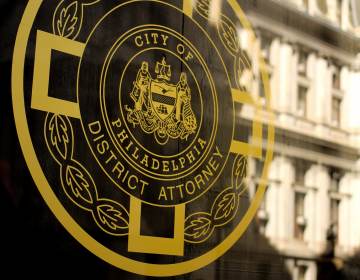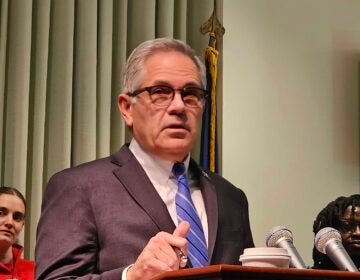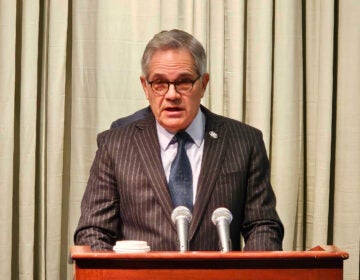In Philly, some fines, court costs that hurt low-income people are going away
Krasner's office said it was waiving fines and fees in an effort to help low-income defendants afford things like transportation and other costs associated with employment.

Philadelphia District Attorney Larry Krasner (Matt Rourke/AP Photo)
This article originally appeared on The Philadelphia Tribune.
—
Attorney Rhonda Hill Wilson was happy to learn this week that Philadelphia District Attorney Larry Krasner’s office decided earlier this week to implement a new policy that will dismiss certain court-mandated fines.
“I think it’s good stuff,” said Wilson, who is a member of the Pennsylvania Interbranch Commission for Gender, Racial and Ethnic Fairness, an organization that addresses inequities in the state court system.
“This is something that should happen around the country. Once you start putting those fees on someone, you can can’t just get out from under it.”
Kranser’s office made its announcement on Wednesday, saying it was waiving fines and fees in an effort to help low-income defendants afford things such as “transportation and other costs associated with employment, education and training programs, completing probation terms, and child or elder care.”
“Philadelphia is a giant step closer to a truly fair and consistent system of justice in which low-income defendants do not face additional punishment by way of unaffordable fines and fees that drive them deeper into debt and poverty,” Krasner said in a statement. The new policy also ensures that restitution is made to victims.
Roughly 26% of Philadelphians live below the federal poverty line, which is an annual income of $19,337 for a family of three, according to the Pew Charitable Trust.
Under the current system, defendants pay fees such as the court-mandated booking center fee ($175), judicial computer project fee ($12), Commonwealth costs ($20), costs of prosecution ($50), county Court cost ($30), state court costs ($14), monthly offender supervision fees ($25), and fees associated with the particular crime in question.
To be considered for the DA’s office’s new policy, defendants must have a form of free legal representation, receive “means-based pubic assistance,” have an income at 125% of the Federal Poverty Guidelines; or show other proof that they have low income.
Keir Bradford-Grey, Chief Defender at the Philadelphia Defender Association, said in a statement that last year the courts ordered Philadelphians to pay more than $21 million in fees despite the city’s high poverty rate.
Pennsylvania’s poor population are not alone in having to deal with the financial burdens associated with court-related fines, which average $13,000 per defendant, according to a recent study by the Harvard Kennedy School.
Many defendants in Alabama were sacrificing food, medicine and other basic necessities — and in some cases, resorting to crime — to pay down burdensome court costs, fines and fees, according to an October 2018 report released by the Alabama Appleseed Center for Law and Justice that looked at the experiences of almost 1,000 Alabama residents.
The report also found that African Americans, due to the “over-policing of African-American communities are disproportionately” impacted.
“For people living just above the poverty line, fines and court fees become an obstacle to rehabilitation,” Bradford-Grey said in a statement. “They can trap people in a cycle of poverty and incarceration and effectively turn our jails into debtor prisons.”
WHYY is your source for fact-based, in-depth journalism and information. As a nonprofit organization, we rely on financial support from readers like you. Please give today.




